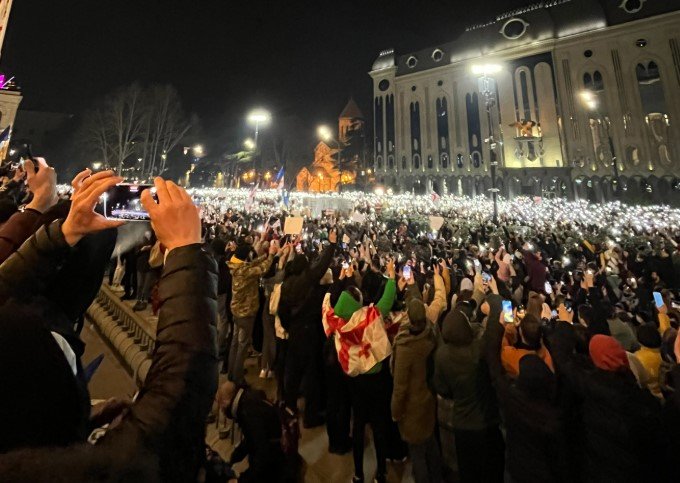Thousands Rally in Tbilisi Against Russian Influence
A massive crowd gathered outside the Georgian Parliament yesterday under the slogan “No to Russian Occupation,” marking three months of sustained demonstrations. Protesters, who assembled at Heroes’ Square before marching down Rustaveli Avenue, are demanding new elections and the release of those arrested in previous protests.
The rally, one of the largest in recent weeks, saw Georgia’s fifth president, Salome Zurabishvili, address the demonstrators from a stage near the First Gymnasium. Zurabishvili’s presence signaled growing political stakes in a movement that shows no sign of fading.
Zurabishvili’s Speech and Its Political Weight
Zurabishvili, often seen as a politically independent figure, delivered a speech that was met with loud applause. She criticized what she described as increasing Russian influence over Georgia’s political landscape and reaffirmed her support for the protestors’ demands.

Her remarks come at a time of heightened political tension. Though she holds a largely ceremonial role, her words carry symbolic weight. Some opposition figures see her involvement as a sign of shifting power dynamics, while government officials dismissed the speech as “political posturing.”
The Protest Movement’s Evolution
What began as isolated gatherings in opposition to the government’s policies has transformed into a sustained movement. Over the past 90 days, protesters have repeatedly called for:
- An end to Russian political and economic influence in Georgia.
- The resignation of key government officials accused of suppressing dissent.
- Immediate elections to replace the current leadership.
The movement has drawn support from students, opposition parties, and civil society groups. Clashes between demonstrators and police have resulted in multiple arrests, fueling further outrage.
Government Response and Rising Tensions
Officials in the ruling Georgian Dream party have remained firm in rejecting calls for early elections. They argue that protests are being manipulated by foreign interests and opposition leaders to destabilize the country.
At the same time, security forces have stepped up measures, with increased police presence in the capital. Reports indicate that law enforcement detained several demonstrators in the past week, prompting human rights organizations to raise concerns about excessive force.
What’s Next for Georgia’s Political Landscape?
The coming weeks could determine the future of Georgia’s leadership and its geopolitical direction. With parliamentary elections scheduled for later this year, both sides appear unwilling to back down.
Zurabishvili’s involvement may add pressure on the government, but whether it will lead to tangible change remains uncertain. For now, the protests on Rustaveli Avenue continue, and the demand for political reform grows louder by the day.
